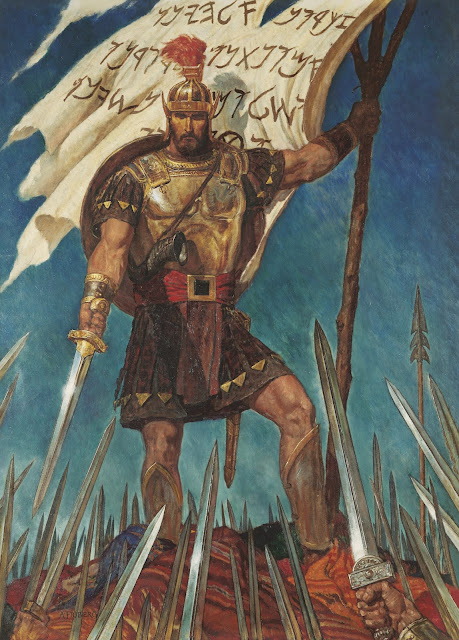 |
Captain Moroni Raises the Title of Liberty (Captain Moroni and the Title of Liberty), by Arnold Friberg (62051); GAK 312; GAB 79; Alma 46:10–37 Accessed August 9, 2020 from https://www.churchofjesuschrist.org/media/image/captain-moroni-title-liberty-82ae654?lang=eng The following two scripture passages describe similar situations but at different time periods in Nephite history. Captain Moroni, the leader of all the Nephite armies, caused dissenters to be put to death if they would not support their government as well as the freedom and liberties it bestowed on them. |
34 Now, Moroni being a man who was appointed by the chief judges and the voice of the people, therefore he had power according to his will with the armies of the Nephites, to establish and to exercise authority over them.Alma 51:15-16
35 And it came to pass that whomsoever of the Amalickiahites that would not enter into a covenant to support the cause of freedom, that they might maintain a free government, he caused to be put to death; and there were but few who denied the covenant of freedom.
15 And it came to pass that he sent a petition, with the voice of the people, unto the governor of the land, desiring that he should read it, and give him (Moroni) power to compel those dissenters to defend their country or to put them to death.
16 For it was his first care to put an end to such contentions and dissensions among the people; for behold, this had been hitherto a cause of all their destruction. And it came to pass that it was granted according to the voice of the people.
The situation described in Alma 46 obviously pre-dated Alma 51. It begs the question, "Didn't Captain Moroni already have the power and authority to put to death defiant dissenters?"
There is an important distinction here. Captain Moroni was a military leader and he had military power and authority. The Amalakiahites were dissenters who were actively rebelling and joining the enemies of the Nephite people.
When he put the defiant Amalakiahites to death, he was operating under his military power and authority. He was addressing acting enemies who were seeking to ally themselves with other active enemies.
In the second example, the dissenters were internal. This was a matter for civil authorities. However, Captain Moroni obviously saw the threat they imposed.
He had no power or authority over a civil situation. However, he recognized that action needed to be taken. He officially asked for civil authority and power to address the problem through the democratic process. Citizens joined him in his appeal.
He waited for the democratic mechanisms to work and decide whether to grant him this power and authority. Ultimately, it did, then he acted.
The other example of his deference to civil authority was when he restored Pahoran to power and eliminated the internal insurrection and rebellion that had displaced the civil government.
7 And it came to pass that Moroni and Pahoran went down with their armies into the land of Zarahemla, and went forth against the city, and did meet the men of Pachus, insomuch that they did come to battle.
8 And behold, Pachus was slain and his men were taken prisoners, and Pahoran was restored to his judgment-seat.
Chances are, Captain Moroni could have installed himself as king, emperor and/or dictator. Many with his skills and influence would have done so, and have, in this situation throughout history.
Instead, he restored the legitimate governing authorities to their rightful places.
This is extraordinary!
Captain Moroni was extraordinary!
Continue reading at the original source →



